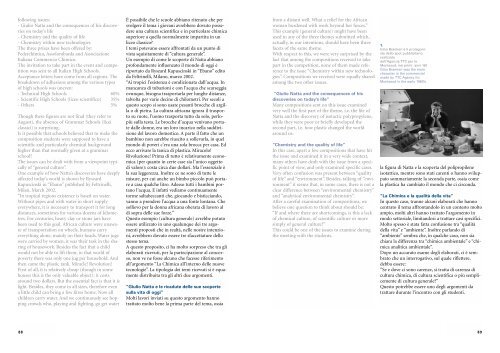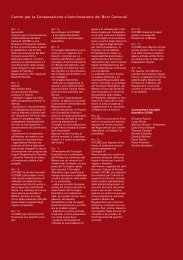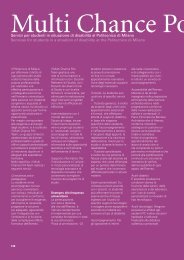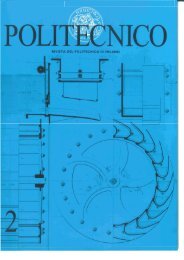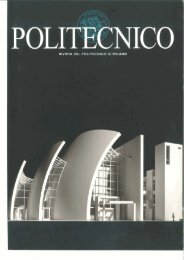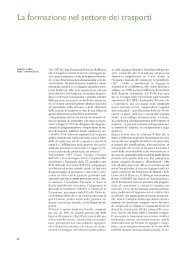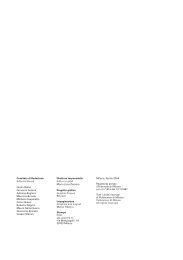Scarica il PDF (1959KB) - Rivista Politecnico - Politecnico di Milano
Scarica il PDF (1959KB) - Rivista Politecnico - Politecnico di Milano
Scarica il PDF (1959KB) - Rivista Politecnico - Politecnico di Milano
You also want an ePaper? Increase the reach of your titles
YUMPU automatically turns print PDFs into web optimized ePapers that Google loves.
following issues:<br />
- Giulio Natta and the consequences of his <strong>di</strong>scoveries<br />
on today’s life<br />
- Chemistry and the quality of life<br />
- Chemistry within new technologies<br />
The three prizes have been offered by:<br />
Federchimica, Assolombarda and Associazione<br />
Italiana Commercio Chimico.<br />
The invitation to take part in the event and competition<br />
was sent to all Italian High Schools.<br />
Acceptance letters have come from all regions. The<br />
breakdown of adhesions among the various types<br />
of high schools was uneven:<br />
- Technical High Schools 60%<br />
- Scientific High Schools (liceo scientifico) 35%<br />
- Others 5%<br />
Though these figures are not final (they refer to<br />
August), the absence of Grammar Schools (licei<br />
classici) is surprising.<br />
Is it possible that schools believed that to make the<br />
composition students were supposed to have a<br />
scientific and particularly chemical background<br />
higher than that normally given at a grammar<br />
school?<br />
The issues can be dealt with from a viewpoint typically<br />
of “general culture”.<br />
One example of how Natta’s <strong>di</strong>scoveries have deeply<br />
affected today’s world is shown by Ryszard<br />
Kapuscinski in “Ebano” published by Feltrinelli,<br />
M<strong>il</strong>an, March 2002.<br />
“In tropical regions existence is based on water.<br />
Without pipes and with water in short supply<br />
everywhere, it is necessary to transport it for long<br />
<strong>di</strong>stances, sometimes for various dozens of k<strong>il</strong>ometres.<br />
For centuries, heavy clay or stone jars have<br />
been used to this goal. African culture were unaware<br />
of transportation on wheels, humans carry<br />
everything alone, mainly on their heads. Water jugs<br />
were carried by women, it was their task in the sharing<br />
of housework. Besides the fact that a ch<strong>il</strong>d<br />
would not be able to lift them, in that world of<br />
poverty there was only one jug per household. And<br />
then came the plastic tank. Miracle! Revolution!<br />
First of all, it is relatively cheap (though in some<br />
houses this is the only valuable object): it costs<br />
around two dollars. But the essential fact is that it is<br />
light. Besides, they come in all sizes, therefore even<br />
a little ch<strong>il</strong>d can bring a few litres home. Now all<br />
ch<strong>il</strong>dren carry water. And we continuously see hopping<br />
crowds who, playing and fighting, go get water<br />
88<br />
È possib<strong>il</strong>e che le scuole abbiano ritenuto che per<br />
svolgere <strong>il</strong> tema i giovani avrebbero dovuto possedere<br />
una cultura scientifica e in particolare chimica<br />
superiore a quella normalmente impartita in un<br />
liceo classico?<br />
I temi potevano essere affrontati da un punto <strong>di</strong><br />
vista squisitamente <strong>di</strong> “cultura generale”.<br />
Un esempio <strong>di</strong> come le scoperte <strong>di</strong> Natta abbiano<br />
profondamente influenzato <strong>il</strong> mondo <strong>di</strong> oggi è<br />
riportato da Ryszard Kapuscinski in “Ebano” e<strong>di</strong>to<br />
da Feltrinelli, M<strong>il</strong>ano, marzo 2002.<br />
“Ai tropici l'esistenza è con<strong>di</strong>zionata dall’acqua. In<br />
mancanza <strong>di</strong> tubazioni e con l’acqua che scarseggia<br />
ovunque, bisogna trasportarla per lunghe <strong>di</strong>stanze,<br />
talvolta per varie decine <strong>di</strong> ch<strong>il</strong>ometri. Per secoli a<br />
questo scopo si sono usate pesanti brocche <strong>di</strong> arg<strong>il</strong>la<br />
o <strong>di</strong> pietra. La cultura africana ignora <strong>il</strong> trasporto<br />
su ruote, l’uomo trasporta tutto da solo, perlopiù<br />
sulla testa. Le brocche d’acqua venivano portate<br />
dalle donne, era un loro incarico nella sud<strong>di</strong>visione<br />
del lavoro domestico. A parte <strong>il</strong> fatto che un<br />
bambino non sarebbe riuscito a sollevarla, in quel<br />
mondo <strong>di</strong> poveri c’era una sola brocca per casa. Ed<br />
ecco arrivare la tanica <strong>di</strong> plastica. Miracolo!<br />
Rivoluzione! Prima <strong>di</strong> tutto è relativamente economica<br />
(per quanto in certe case sia l’unico oggetto<br />
<strong>di</strong> valore): costa circa due dollari. Ma l’essenziale è<br />
la sua leggerezza. Inoltre ce ne sono <strong>di</strong> tutte le<br />
misure, per cui anche un bimbo piccolo può portare<br />
a casa qualche litro. Adesso tutti i bambini portano<br />
l’acqua. E infatti ve<strong>di</strong>amo continuamente<br />
torme saltabeccanti che, giocando e bisticciando,<br />
vanno a prendere l’acqua a una fonte lontana. Che<br />
sollievo per la donna africana oberata <strong>di</strong> lavoro al<br />
<strong>di</strong> sopra delle sue forze.”<br />
Questo esempio (cultura generale) avrebbe potuto<br />
essere ut<strong>il</strong>izzato in uno qualunque dei tre argomenti<br />
proposti che in realtà, nelle nostre intenzioni,<br />
avrebbero dovuto essere tre sfaccettature dello<br />
stesso tema.<br />
A questo proposito, ci ha molto sorpreso che tra gli<br />
elaborati ricevuti, per la partecipazione al concorso,<br />
non ve ne fosse alcuno che facesse riferimento<br />
all’argomento “La Chimica all’interno delle nuove<br />
tecnologie”. La tipologia dei temi ricevuti si è equamente<br />
<strong>di</strong>stribuita tra gli altri due argomenti.<br />
“Giulio Natta e le ricadute delle sue scoperte<br />
sulla vita <strong>di</strong> oggi”<br />
Molti lavori inviati su questo argomento hanno<br />
trattato molto bene la prima parte del tema, ossia<br />
from a <strong>di</strong>stant well. What a relief for the African<br />
woman burdened with work beyond her forces.”<br />
This example (general culture) might have been<br />
used in any of the three themes submitted which,<br />
actually, in our intentions, should have been three<br />
facets of the same theme.<br />
With respect to this, we were very surprised by the<br />
fact that among the compositions received to take<br />
part in the competition, none of them made reference<br />
to the issue “Chemistry within new technologies”.<br />
Compositions we received were equally shared<br />
among the two other issues.<br />
“Giulio Natta and the consequences of his<br />
<strong>di</strong>scoveries on today’s life”<br />
Many compositions sent on this issue examined<br />
very well the first part of the theme, i.e. the life of<br />
Natta and the <strong>di</strong>scovery of isotactic polypropylene,<br />
wh<strong>il</strong>e they were poor or briefly developed the<br />
second part, i.e. how plastic changed the world<br />
around us.<br />
“Chemistry and the quality of life”<br />
In this case, apart a few compositions that have hit<br />
the issue and examined it in a very wide context,<br />
many others have dealt with the issue from a specific<br />
point of view, and only examined specific cases.<br />
Very often confusion was present between “quality<br />
of life” and “environment”. Besides, talking of “environment”<br />
it seems that, in some cases, there is not a<br />
clear <strong>di</strong>fference between “environmental chemistry”<br />
and “analytical environmental chemistry”.<br />
After a careful examination of compositions, we<br />
believe one question to think about should be:<br />
“If and where there are shortcomings, is this a lack<br />
of chemical culture, of scientific culture or more<br />
simply of general culture?”<br />
This could be one of the issues to examine during<br />
the meeting with the students.<br />
1.<br />
Gino Bramieri è <strong>il</strong> protagonista<br />
dello spot pubblicitario<br />
realizzato<br />
dall'Agenzia TTC per la<br />
Montesud, nei primi anni '60<br />
Gino Bramieri was the main<br />
character in the commercial<br />
made by TTC Agency for<br />
Montesud in the early 1960’s<br />
la figura <strong>di</strong> Natta e la scoperta del poliprop<strong>il</strong>ene<br />
isotattico, mentre sono stati carenti o hanno sv<strong>il</strong>uppato<br />
sommariamente la seconda parte, ossia come<br />
la plastica ha cambiato <strong>il</strong> mondo che ci circonda.<br />
“La Chimica e la qualità della vita”<br />
In questo caso, tranne alcuni elaborati che hanno<br />
centrato <strong>il</strong> tema affrontandolo in un contesto molto<br />
ampio, molti altri hanno trattato l’argomento in<br />
modo settoriale, limitandosi a trattare casi specifici.<br />
Molto spesso è stata fatta confusione tra “qualità<br />
della vita” e “ambiente”. Inoltre parlando <strong>di</strong><br />
“ambiente” sembra che, in qualche caso, non sia<br />
chiara la <strong>di</strong>fferenza tra “chimica ambientale” e “chimica<br />
analitica ambientale”.<br />
Dopo un accurato esame degli elaborati, ci è sembrato<br />
che un interrogativo, sul quale riflettere,<br />
debba essere:<br />
“Se e dove ci sono carenze, si tratta <strong>di</strong> carenza <strong>di</strong><br />
cultura chimica, <strong>di</strong> cultura scientifica o più semplicemente<br />
<strong>di</strong> cultura generale?”<br />
Questo potrebbe essere uno degli argomenti da<br />
trattare durante l’incontro con gli studenti.<br />
89


